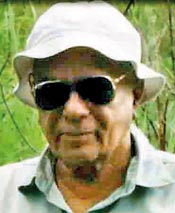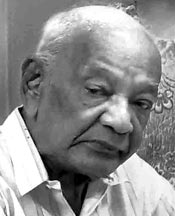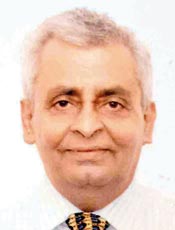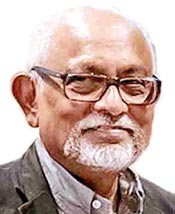Appreciations
View(s):Outstanding scholar and scientist who always saw the bigger picture
DR. C.R.PANABOKKE
 Vidya Jyothi’, ‘Deshamanya’, and former Chancellor of the Sabaragamuwa University of Sri Lanka, Dr. C. R. Panabokke, an internationally renowned soil scientist and pioneer in agricultural research in Sri Lanka, passed away peacefully on August 28 at the age of 97 years.
Vidya Jyothi’, ‘Deshamanya’, and former Chancellor of the Sabaragamuwa University of Sri Lanka, Dr. C. R. Panabokke, an internationally renowned soil scientist and pioneer in agricultural research in Sri Lanka, passed away peacefully on August 28 at the age of 97 years.Christopher Rajindra Panabokke was born on March 24, 1926 at his ancestral home – ‘Panabokke Waluwwa’, in Wattappola- Udunuwara, about six km south of Pilimatalawa. His father was C.B. Panabokke, a landed proprietor, and his mother was May Jayewardene from Hikkaduwa. He was the third child and the first boy in a family of seven (four boys and three girls).
His mother had been educated at Holy Family Convent, Colombo, and his father at Kingswood College Kandy. They were both devout Buddhists. His parents valued education and culture more than acquisition of wealth and decided to send their young son first to Hillwood College, Kandy, and thereafter, to St. Anthony’s College, Katugastota. He was transferred from St. Anthony’s to St. Benedict’s College, Colombo because he was interested in studying science.
He entered the University in 1945. He recalled that he was at Brodie hostel and they had two excellent deputy Wardens (P. Gerald Cooray, and Sam Wijesinha). In an interview he had said, “Sam Wijesinha would often engage us in discussing world issues. This stimulated our thinking. I also participated in activities of the Drama Society, Classical Music Society and Travel Society…. We used to travel around the country during the long vacations. On one such trip, we went to Gal Oya. The dam was just being constructed, and this sight had a profound influence on me…. It sparked an interest in national development.”
“Sir Ivor Jennings was Vice Chancellor at the time and the University had some excellent teachers such as Professor A.W. Mailvaganam (Physics), Eric Fonseka (Chemistry) and C. J. Eliezer (Mathematics). The chalk and blackboard physics of Prof. Mailvaganam strongly influenced my scientific thinking. I did very well in Physics, but after the first term, I decided to specialize in chemistry because chemistry graduates had better job opportunities.”
Graduating with a special degree in Chemistry in 1949, his first job was in the Government Analyst’s Department where he served for just six months. In October 1950, he applied for the position of Research Officer/Res. Probationer in the Department of Agriculture (DOA). In this extract from a published interview, he says: “I was interviewed by Dr. Rhind (Director of Agriculture) and Dr. A.W.R. Joachim. They asked me ‘where have you travelled in the country, and what made you travel?’ I told them that I was interested in seeing the hinterland and learning about my people and our ancient history. ‘Would you like to go to Polonnaruwa and engage in sugarcane research?’ they asked. “I would like it very much,” I said. What makes you so enthusiastic about Polonnaruwa?” they shot back. “I can swim across the Mahaweli and engage in elephant watching during my spare time,” I replied. They burst out laughing and said, ‘You are just the man for us.”
Professional career
He had read R.L. Brohier’s ‘Ancient Irrigation Works of Ceylon’ and spent most of his leisure time visiting the sites described by Brohier. But the greatest influence on his professional life happened to be his meeting with the legendary Dr. Earnest Abeyratne, founder Director of the Dry Zone Agricultural Research Station at Mahailluppallama. They were cast in the same mould, both field-oriented, practical men, having an open mind – always willing to learn and appreciate the ancient wisdom of ‘traditional farmers’ and their farming systems. Dr. M.F. Chandraratne (Botanist and Senior Agricultural Research Officer at the time, and subsequently, the Director of Agriculture), also had a strong influence on him.
Having spent two years at Mahailluppallama, he was offered a Colombo Plan Scholarship in 1954 to study for his Ph.D. in soil physics at the prestigious Waite Agricultural Research Institute affiliated to the University of Adelaide, Australia. This was to be another defining moment, having a profound influence on his scientific work. He completed his Ph.D. in soil physics in 1956, having been placed ‘Proxime Accesesserunt” for the Cuiross Prize for scientific research.
Dr. Panabokke returned to Sri Lanka and to Mahailluppallama, in October 1956, and continued his work. The rest is history, amply documented in a special publication of the Soil Science Society of Sri Lanka (Vol.11, 2011).
In a professional career spanning almost 60 years, Dr. Panabokke adorned the position of Director of Agriculture for four years (1978-1982). He retired four years later at the age of 55 “to make way for others”.
After retirement, he served the International Service for National Agricultural Research (ISNAR) in the Hague, Netherlands, and the International Irrigation Management Institute (IIMI- now IWMI).
He was unquestionably the foremost soil scientist produced by our country to date, as well as one of Asia’s most renowned soil scientists. He authored several books and published over 30 research papers in reputed international journals in addition to presenting 35 scientific papers at national and international workshops/conferences on soils of Sri Lanka and fertilizer use, groundwater conditions in Sri Lanka, small village tank systems, and agro-ecological environments of Sri Lanka.
He was Chancellor of the Sabaragamuwa University of Sri Lanka (1999-2004) and received the Natural Science Council Sri Lanka award for outstanding research for 1981/1982. He was also President (section B) of the Sri Lanka Association for the Advancement of Science in 1968, President of the Soil Society of Ceylon, 1974 to 1981, and was a fellow of the National Academy of Sciences, Sri Lanka.
Family life
He met Seemanthi Madugalle at Mahailluppallama in a group of students from the School of Agriculture in Kundasale visiting the Mahailluppallama research station. “It was love at first sight … we married in 1956. Yes, she has been a major stabilizing influence on my life… she managed the home front efficiently giving me all the time to engage in my work,” he once said in an interview. His wife predeceased him as did his elder daughter Aruni. He is survived by two daughters Renuka and Himadri.
Personal connection
I met Dr. Panabokke when he conducted a course on ‘Soil Science’ for the Botany Special Degree batch of the University of Colombo in the late 1960s.
Eight years later, when he was the Deputy Director of Agriculture (Research), he was at an interview board to select Research Officers for the DOA at which I was one of the successful candidates. He placed me at the National Herbarium of the Royal Botanic Garden. As Head of the DOA’s Research Division, he became my boss. Three years later, when he was the Director of Agriculture, and when I was awarded a fellowship at the New York Botanical Garden to pursue Ph.D. studies, he facilitated my leaving for the USA.
After completing my studies in three and a half years, I returned and served the DOA till my retirement. I like to attribute this to his great foresight placed on the trustworthiness of a junior officer that he would return with enhanced qualifications to serve the country.
Dr. Panabokke was not only an outstanding scholar and scientist, but also an exceptional human being – a man of the highest integrity, honesty, sincerity, humility, and a true patriot. He had the exceptional ability to “see the big picture” and grasp its relevance to national development. He was well versed in the humanities- art, music, drama and literature; also a great conversationalist full of wit and many rib-tickling anecdotes – truly a ‘man for all seasons’.
Several of his close associates have narrated some of his vision and thoughts and a few excerpts are given here:
“The biggest satisfaction I get is when I have shed light on a thing that has been obscure. I am satisfied that I have been able to push the frontiers of knowledge from which other people can build upon. My greatest achievement is that I have been able to find the true origins of irrigation in this country.”
When asked about what he would like to be remembered most for, he said, “I would like to be remembered for having built up a school of thinking on soils, agro-ecology, groundwater and small village tanks. I was always willing to learn and appreciate the ancient wisdom of ‘traditional farmers’ and their farming systems.”
When a colleague asked him if he had any regrets, he replied: “None at all. In fact, I consider myself very fortunate to have been in the right place, at the right time, with the right people. I have had a good life.”
His government pension was 29,000 rupees a month.
May he attain the supreme bliss of Nibbana.
Dr. Magdon Jayasuriya
A fine lawyer and great friend
LIONEL KEERTHINAYAKA KARAWITA
 The news of the passing away of H.L.K. Karawita was conveyed to me from Dubai by Ruklanthi, daughter of late Joe Rajakaruna. I was shocked because I was not aware of his death. There was no SMS as usual from the Bar Association informing on deaths of lawyers.
The news of the passing away of H.L.K. Karawita was conveyed to me from Dubai by Ruklanthi, daughter of late Joe Rajakaruna. I was shocked because I was not aware of his death. There was no SMS as usual from the Bar Association informing on deaths of lawyers.
I miss him very much since I am what I am today because of his help, guidance, and advice – received when I could not stand on my own feet, after passing out from Law College and finding no firm of lawyers nor any seniors to take me on due to my lack of qualifications in Sinhala. Since he was a card-playing friend of my father’s, he offered to take me to Hatton to practise as well as to advise the Ceylon Plantations Workers Union of which he was the President, on a monthly salary of Rs. 300 in addition to private practice.
Mr. Karawita was an ardent communist who was associated with the great trade unionist, N. Shanmugathasan who was a follower of the Peking Wing communism of China. The Peking Wing was a breakaway group from Russian communist ideology and propounded their own ideology.
I continued my relationship with Mr. Karawita even after coming to Colombo wherein I was instructing him in partition and land cases learning the basics of the actions and remedies. He argued cases with common sense without confusing the judges drawing in complex legal issues which satisfied most of the judges.
He would occupy a particular table in the lounge along with Max Bastiansz, late Mr. Mohideen, late Joe Rajakaruna, Raja Mudannayaka, Nimal Ranamuka Arachchi and myself. But today I see the table occupied by the most recent juniors. We used to hear anecdotes about various senior lawyers with whom Mr. Karawita had worked when he started his practice. It was really amusing to hear these anecdotes. One was about how Mr. Thiyagalingam Q.C. appeared before Justice H.W. Thambiah in the Supreme Court in a partition case appeal. While Mr. Thiyagalingam was on his feet, Justice Thambiah had been interrupting him and telling the counsel, “Mr. Thiyagalingam, I used to do more of these cases when I was practising,” to which Mr. Thiyagalingam had replied, “less said the better”. If this was uttered in any court today one may be charged for contempt, but Judges then took these remarks with a sense of humour.
Mr. Karawita was a good entertainer when juniors or other attorneys went to him for consultation. After finishing he would tell the client, ‘you can now leave and we will look after the legal part of the case’ and start treating the juniors and instructing attorneys again to his usual anecdotes which kept us laughing till the end.
Kara, we miss you every day. I miss the daily walk with you on Marine Drive in the morning which you even continued in the evening – helping you to maintain your physical condition without any illness whatsoever till the late years of your life.
You have your beloved niece Viveka, Additional Solicitor General and President’s Counsel to carry on your mantle in this glorious profession.
We will cherish fond memories of the gentlemen who was H.L. Karawita.
Teacher, teacher, my hands are cramped
The gems you throw I try to cram
No time to lose, I forget
To store in my head before the day’s spent
A world of law unique to your own
With great learning and hard toil sown
Vocal mastery and presentation of law
In rapt attention as we all gazed
The humble man with ready humour and wit
With nary a care for politics or wealth
Honesty, integrity, etched on the face
Calm confidence, but arrogance, not a trace
Adieu! Dear Teacher for a life well spent
Your unwavering faith stood in good stead
May you be the role model we all emulate!
Till we meet again.
K. Kaneshayogan
Remembering a giant in the telecom industry
Christie Alwis
 Christie Alwis, a true luminary in the field of telecommunications, a professional engineer with over 30 years of dedicated service in the industry, breathed his last on September 1, 2023. He leaves behind a legacy of innovation, leadership, and a profound impact on the telecom landscape in Sri Lanka and beyond.
Christie Alwis, a true luminary in the field of telecommunications, a professional engineer with over 30 years of dedicated service in the industry, breathed his last on September 1, 2023. He leaves behind a legacy of innovation, leadership, and a profound impact on the telecom landscape in Sri Lanka and beyond.
Mr. Alwis began his illustrious career in 1977 when he joined Sri Lanka Telecom (SLT). Over the years, he ascended through the ranks and held several key positions within the organisation, demonstrating unwavering commitment and expertise in his field. Notably, he served as an engineer, overseeing crucial aspects of switching and transmission in both the Telecommunication Department (Government) and Sri Lanka Telecom (corporation).
In 1997, Mr. Alwis took on the role of Director Customer Services and Executive Assistant to the CEO under the Japanese management of SLT. He transitioned to the role of Chief Network Officer – Network Planning and Engineering Group from 2002 to 2007, contributing significantly to the development and expansion of
Sri Lanka’s telecommunications infrastructure.
In 2007, he took on the role of Senior Officer – Corporate Strategic Planning at SLT, once again demonstrating his versatility and adaptability in the ever-evolving telecommunications industry.
Beyond his impressive career, Mr. Alwis was a passionate educator. He served as a Visiting Lecturer for Communication Engineering and Computer Science at the University of Moratuwa and the University of Sabaragamuwa, enriching the minds of countless students over his 25 years as a lecturer.
Mr. Alwis’s contributions will be remembered not only for his technical prowess but also for his leadership, mentorship, and dedication to the development of the next generation of telecom professionals.
As we mourn the loss of this telecommunications veteran, our thoughts and condolences go out to his family, friends, colleagues, and all those whose lives he touched. Christie Alwis’s legacy will continue to shine brightly in the annals of Sri Lanka’s telecommunications history.
Malraj Balapitiya
A livewire of the Batch of ’64 is no more
Dr. Rex Clements
 I was extremely saddened to hear about the passing away of my very close friend, colleague and batchmate Rex Clements, in Melbourne, Australia a few days ago, after a brief illness. He was my roommate in university, an accomplished lecturer, scientist and gentleman of the highest order.
I was extremely saddened to hear about the passing away of my very close friend, colleague and batchmate Rex Clements, in Melbourne, Australia a few days ago, after a brief illness. He was my roommate in university, an accomplished lecturer, scientist and gentleman of the highest order.
Rex Clements, born on April 2, 1945 at Moray Group, Maskeliya to Victor and Stella Clements, had his entire primary and secondary education at Christian College, Kotte. In 1964 having passed the University entrance examination he entered the University of Peradeniya to pursue a degree in Agriculture and was one of the 23 of the batch of ’64 to join the Faculty of Agriculture that year.
Soon after graduation in 1968, with a First Class honours, (he obtained 13 Distinctions out of 14 subjects) breaking the existing record of late Prof. R.R. Appadurai, he joined the Faculty of Agriculture as an Assistant Lecturer of the Department of Crop Science. In 1970 he travelled to the United Kingdom for his postgraduate studies and obtained a PhD in crop physiology, from the University of Reading, Berkshire. On his return to Sri Lanka he continued as a Lecturer in Crop Science to both undergraduate and post graduate students of the Faculty of Agriculture.
In 1980, he joined the International Rice Research Institute in Los Banos, Philippines as a Post Doctoral Fellow and continued his research activities in rice based cropping systems. This in fact was in preference to a postdoc offer at Lincoln College, New Zealand.
However, in 1986 he decided to move out of Sri Lanka and joined the University of South Pacific, Alafua Campus, Western Samoa as the Head of Department of Crop Science.
In 1989 he moved to Australia and joined the Victorian College of Agriculture and Horticulture of the Glenormiston Campus, which was taken over by the University of Melbourne in 1991. He worked there as a Senior Lecturer until about 2012.
Rex was a live wire of the Agricola Batch of ’64. He was an accomplished musician, the vocalist and guitarist of the batch. He was a key figure of the three-man band named the ‘Agricolas’, who were often invited to Halls of Residence for their annual socials. The organizers provided a sumptuous dinner and the band played popular English and Sinhala songs, especially local oldies, keeping the crowds happy.
Rex Clements was also a talented badminton player. He played for the Peradeniya University in 1967 and 1968 and obtained University colours.
Rex was a kind and generous person and led a simple and happy life helping people whenever possible. He was loved by all his friends as a person who was trustworthy and dependable. He was a brilliant teacher who was always very friendly with students. He had a unique way of using the blackboard and students admired his way of teaching.
All of us from the batch of ’64 will miss him very much.
On a final and personal note, Rex was my ‘bestman’ at my wedding and my elder daughter was flower girl at his wedding. That was how close we were. I will miss him a lot. May God bless his soul.
Dr. Noble Jayasuriya
(On behalf of the Peradeniya University Agriculture batch of 1964)
Searching for an ideal partner? Find your soul mate on Hitad.lk, Sri Lanka's favourite marriage proposals page. With Hitad.lk matrimonial advertisements you have access to thousands of ads from potential suitors who are looking for someone just like you.


